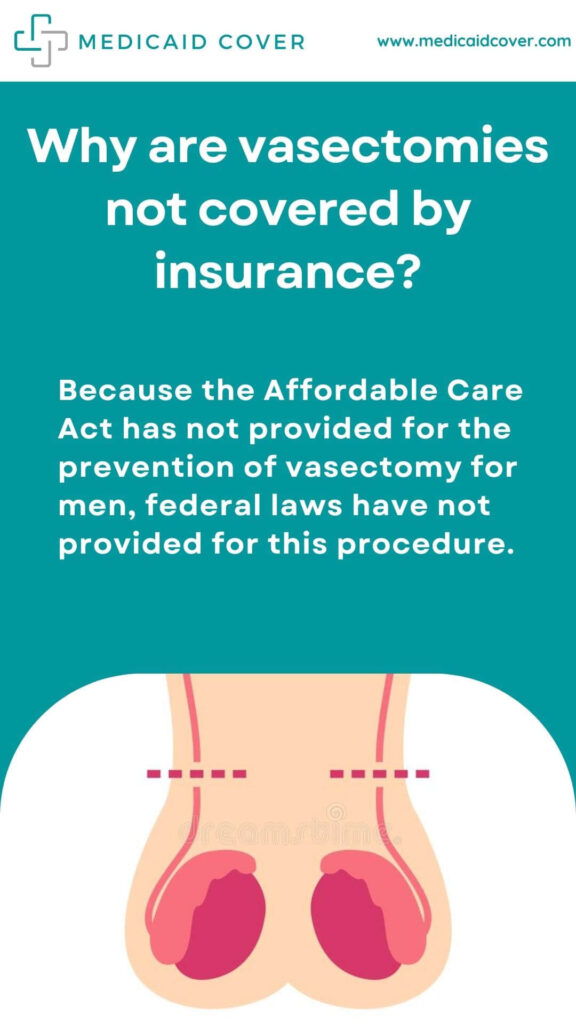Vasectomy is a medical term used for a condition in which male vasa deferentia is blocked to prevent fertilization. It is permanent contraception or male sterilization. The procedure is not very complicated so there is no need for hospitalization and can be done in a physician’s office.
Most insurance companies reimburse for vasectomy surgery. If your insurance company offers vasectomies, it is advisable to consult your insurer to confirm.
After your yearly deductible is lowered your medical coverage may be covered by health care insurance. If your vasectomy is required under Medicaid or Medicare, the cost will likely pay for your treatment.
You must be age 21 or older. You must also complete a consent form 30 before the procedure. Let’s continue to know more about vasectomy and how Medicaid covers vasectomy. Everyone needs some home care after going through a medical procedure, You check if Medicaid also covers home health care? Read more here.
Medical Usage Of Vasectomy
An operation known as a vasectomy is performed to stop men from becoming fathers. This long-term male contraception is frequently performed as an outpatient operation and is usually regarded as a low-risk technique.
Medical professionals employ a range of procedures to surgically and irreversibly stop the flow of sperm to semen. Medicaid covers vasectomy which is theoretically reversible. But since they are difficult and frequently ineffective in recovering fertility, patients should think of them as permanent. Lets see if the ambulance covers with medicaid or not. Its the top most requirement during an emergency.
Common Reasons For Vasectomy
Listed below are some of the typical reasons men choose a vasectomy, even though there are several less intrusive and permanent birth control methods available for males : –
- Both parties in their committed relationship have decided to use a long-term method of birth control.
- Individuals are currently in a connection in which childbirth is a threat to the spouse.
- The male or his spouse has a genetic disease they may pass on to their kid if a pregnancy happened.
- Men who have opted for vasectomy as their preferable birth control option for both themselves and their spouses have stated that they did so because they believed it to be less hazardous than methods of permanent sterilization for women.
- Or because they thought this was his turn to be in charge of contraceptive methods in their relationship.
Vasectomy’s Efficiency
Medicaid covers vasectomy and outcomes are not usually instantaneous and are not always effective. To become sterile, it takes a few weeks or 15 to 20 ejaculations. Six to sixteen weeks following the surgery, your healthcare physician will often ask for a sample of semen to check for viability.
A vasectomy must occasionally be repeated. Use an alternative method of birth control until your doctor certifies if the vasectomy was effective.
Limitations And Restrictions
In most states, if contraception is used it is limited in quantity or doses as stated. States that defined quantity limits or doses for either method included :-
- California
- Illinois
- Michigan
- Missouri.
Another condition reflects what types of services are available for supplying or dispensing contraceptive drugs.
California only permits clinics to give injection-based contraceptive products, but restricts the distribution of diaphragmatic drugs at pharmacies. A clinic or pharmacy can offer the contraceptive pill and vaginal ring depending on the product supplied and Medicaid covers vasectomy.
Read Also:
Does Medicaid Cover Birth Control?
How Much Does A Vasectomy Cost?
Although a vasectomy covered by Medicaid can be reversed, the treatment is not always successful. Only if you are positive that you intend not to dad children in the future should you think about getting a vasectomy.
Vasectomy is a long-term method of birth control that is more than 99% successful in preventing conception. On a long-term basis, it is also the most economical kind of birth control.

In the US, a vasectomy ranges from $300 to $3,000. Male sterilization surgery frequently costs between $1,000 and $1,500 as an outpatient treatment. Although a vasectomy may be covered by insurance, it isn’t necessary for health care as defined by the Affordable Care Act.
The cost varies depending upon where and which type of vasectomy you receive. Vasectomies are usually free of charge in a lot of government programs, Medicaid, or other programs. Even though a vasectomy can sometimes be expensive, you typically save a great deal on a long-term basis since your surgery lasts for an eternity.
Is Contraception Covered By Medicaid?
State Medicaid programs are required by federal regulations to offer family planning services to patients at no cost to them. Family planning as a wide category might encompass contraception as well as other associated services including testing for cancer, HIV, and STDs.
Even if individuals don’t fulfill other eligibility conditions, several states increased part or all Medicaid health coverage under the Affordable Care Act (ACA), which was implemented in 2010. States might decide to either provide all Medicaid coverage to a wider population or only family planning services.
The coverage requirements for those who qualify under the expansion must follow tougher guidelines in the 38 states (plus Washington, D.C.), that opted into the full Medicaid expansion.
Steps For Obtaining Coverage
You must locate an Advantage plan with coverage for vasectomy. Several methods exist for doing this :-
- Speak with your doctor or a billing representative at your doctor’s office as an excellent starting step.
- Additionally, you can speak with local suppliers of Advantage plans directly. To identify the plans available in your ZIP code, use the Medicaid website at www.medicaid.gov.
- You may focus your search on insurance plans that are affordable and have your doctor’s office included in the network.
- You can also get in touch with the State Health Insurance Assistance Program (SHIP) office in your area.
- You may learn more about the plans available in your region from a SHIP counselor, including specifics on what they cover.
Which Contraceptives Is Medicaid Going To Cover?
Medicaid covers vasectomy is not mandated by the ACA, however, the Kaiser Family Foundation found that the majority of state Medicaid programs it examined did offer this service. The U.S.-approved methods of contraception are covered by your state’s Medicaid program if it does. Drug Enforcement Agency. These techniques can be grouped broadly into:
- Counselling and education for patients.
- Hormonal techniques, such as vaginal rings and birth control tablets.
- Intrauterine devices, such as IUDs, are implanted.
- Barrier techniques, such as sponges and diaphragms.
- Sterilization techniques
- emergency birth control.
Which Vasectomy Procedures Are Covered By Medicaid?
-
Vasectomy With No Scalpel
The vas deferens will be located during this vasectomy procedure, and they will be clamped in place. An incision will then be made in the skin using an instrument. The hole will then be widened to make room for the vas deferens. After that, the pipes would be cut and sealed.
-
Vasectomy Using A Clip
Special hooks would be inserted over each duct and secured there when the vas deferens are exposed during this vasectomy procedure. Sperm flow beyond the area in which the hooks have already been put will be blocked by the clips.
Advice On Cutting Costs
Some medical facilities and doctor’s offices allow you to set up a payment schedule. The expense of the procedure might be spread out over several months in smaller installments. Typically, you’ll have to pay for these before the surgery. Other clinics could accept payments using credit products designed specifically for medical services.
With the help of these products, you may obtain a loan or credit card that you can use to pay for optional medical treatments like a vasectomy. You may find out if and how they handle this form of payment from your doctor’s office.
Vasectomy Reversal
A reversal is seen as a significant operation in contrast to a vasectomy, which is a simple procedure. Some of the differences between the two are as follows:
- A vasectomy may be completed in about 20 minutes, while a reversal procedure might take anywhere between two and five hours.
- Depending on where you have the operation done, reversals might run you anywhere from $5,000 to $12,000 in costs.
- While removals may have unfavorable effects, reversals have more difficulties, including fluid buildup in the scrotum and injury to arteries and nerves
- A vasectomy typically takes two days to complete, but its reversal often takes a week. Vasectomy reversal techniques come in two different varieties.
- The most common one is a vasovasostomy when the surgeon makes an incision in the scrotum close to where the vasectomy was done and looks at the vas deferens.
- To check for sperm, the surgeon takes fluid from the vas end. If any, the testicular cone and the duct’s terminus are brought together by the vas deferens to form a new connection.
- The surgeon will perform a vasoepididymostomy to open the epididymis if no sperm are discovered. The epididymis must be connected, which is more challenging.
Conclusion : –
Medicaid covers vasectomy and provides important support to low-income women. Family planning is a mandatory benefit under Medicaid and is provided to all people in the childbearing period. It is provided free of charge. The Federal government does NOT officially define family planning but has given state agencies considerable discretion in deciding which services are covered by this benefit.
In addition, a state could set varying requirements for obtaining Medicaid family planning services based on different eligibility paths.
Frequently Asked Questions
Can the expense of a vasectomy be covered by an FSA or HSA?
There is some good news for you if your insurance plan doesn’t cover all of your vasectomy expenses. To pay for the out-of-pocket expenses, you can utilize a flexible spending account or a health savings account. This can pay for the entire procedure or a large chunk of it, depending on your funds.
Is a vasectomy deductible on taxes?
Yes. One of the things you may deduct from your medical expenses is a vasectomy. To ensure you may claim the deduction, you should speak with a tax professional.
Is female sterilization more affordable than a vasectomy?
A vasectomy will cost far less than having your partner’s tubes tied if you are hesitating between the two procedures. The cost of female sterilization will typically be six times more than that of a vasectomy. Furthermore, it’s riskier and more intrusive.
Should I Have IVF or a Tubal Reversal?
Choose tubal reversal if you are a young lady who desires multiple additional children spaced out over several years. IVF is a good option if you want to become pregnant but don’t want to use contraception in the future. Use IVF if you just want one kid.
Why are vasectomies not covered by insurance?
Because the Affordable Care Act has not provided for the prevention of vasectomy for men, federal laws have not provided for this procedure.
Does Medicaid cover vasectomy in North Carolina?
Medicaid shall reimburse sexual treatment for men aged 21 or older who meet the requirements for 42 CFR Part 441 Sub-part f – Sterilization as a regulated health policy.

